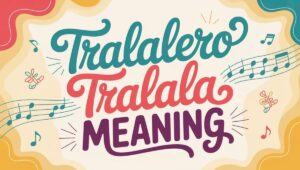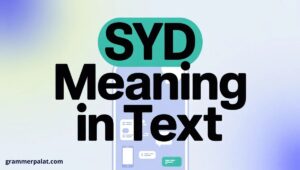Language is full of expressions that go beyond literal meaning, carrying emotional depth and personal nuance. One such phrase is “resonates with me” a term you’ve probably heard in conversations, interviews, or even on social media posts. But what does it actually mean? Where did it come from? And how can you use it in your own speech or writing?
In this guide, we’ll explore resonates with me meaning, its origins, different contexts where it’s used, and even common mistakes like “resignated with me.” By the end, you’ll know exactly how to use this powerful phrase in a way that feels authentic and expressive.
Understanding “Resonates With Me” – The Core Meaning
At its heart, “resonates with me” is about emotional connection. When you say something resonates with you, you’re expressing that it strikes a chord, hits home, or aligns with your personal feelings, beliefs, or experiences.
Think of resonance in the literal sense when a sound wave causes another object to vibrate at the same frequency. In language, this idea is used metaphorically: a thought, story, song, or idea causes an internal “vibration” because it matches your emotional or mental wavelength.
In simpler terms:
- Resonates with me meaning → It deeply connects with my emotions, values, or experiences.
- Example: “What you said about chasing your dreams really resonates with me.”
Here’s what it looks like in everyday language:
| Situation | Example |
|---|---|
| Hearing a speech | “Her words about kindness and empathy truly resonated with me.” |
| Watching a movie | “That character’s struggle really resonates with me because I went through something similar.” |
| Reading a book | “This passage resonates with me it captures exactly how I’ve been feeling.” |
The Emotional Layer – Why It Feels Powerful
The reason “resonates with me” is so impactful lies in personal resonance. Unlike generic agreement, resonance implies:
- A deeper connection – not just “I agree,” but “I feel this.”
- Shared values or experiences – you’ve lived something similar.
- Emotional impact – it touches your heart in a memorable way.
For instance, when Sarah, a teacher from Chicago, read a post about overcoming failure, she said, “This really resonates with me. It’s exactly what I needed to hear after a tough semester.” It wasn’t just relatable it was comforting, validating, and empowering.
Resonates With Me Meaning vs. Simple Agreement
It’s easy to confuse resonance with basic agreement, but they’re not identical.
- Agreement = Intellectual alignment (“I think you’re right.”)
- Resonance = Emotional + intellectual alignment (“I feel this deeply, and it reflects my own beliefs or experiences.”)
For example:
- Agreement: “Yes, saving money is important.”
- Resonance: “Your story about paying off debt resonates with me I went through the same struggle last year.”
A Quick Look at the Origin of “Resonates With Me”
The verb “resonate” comes from the Latin resonare, meaning “to resound” or “echo.” It first entered English in the 16th century in a literal sense, referring to sounds that reverberate.
Over time, its meaning expanded to include emotional or intellectual echoes. By the late 20th century, “resonates with me” became a popular way to describe personal connection with ideas or emotions.
Interestingly, you’ll often see it in literature reviews, music critiques, and personal blogs all spaces where people describe how art or ideas affect them on a personal level.
Different Contexts of Use
Let’s break down the phrase’s modern usage across different scenarios:
1. In Conversations About Art and Media
- “This song really resonates with me it’s like it was written about my life.”
- “That scene in the movie resonated with me so much. I’ve been there.”
2. In Professional or Motivational Settings
- “Your presentation on leadership resonates with me because I’ve faced similar challenges managing a team.”
- “This quote resonates with me it’s going in my office.”
3. In Personal Relationships
- “What you said about honesty resonates with me. That’s how I try to live.”
- “Your approach to parenting resonates with me. I want to raise my kids with those values.”
Common Mistakes: “Resignated With Me”
A frequent error people make is saying “resignated with me” instead of “resonated with me.”
- Resonated → correct form of “resonate,” meaning connected or echoed emotionally.
- Resignated → not a real word in standard English; likely confused with “resigned.”
Example of misuse: “That speech really resignated with me.” ❌
Corrected: “That speech really resonated with me.” ✅
Resonates With Me in Social Media Culture
On platforms like Instagram, TikTok, and Twitter, people often use “resonates with me” to caption memes, quotes, or short videos. It’s shorthand for saying:
“This content speaks to me on a personal level.”
For example, a video about procrastinating might be shared with the comment, “Wow… this resonates with me way too much.”
Interestingly, in online spaces, humor and shared struggles often drive resonance a relatable post about binge-watching shows instead of working will “resonate” with many people stuck in the same habit.
Related Phrases and Synonyms
Here are some alternative ways to express resonates with me meaning:
- “That hits home.”
- “I feel that deeply.”
- “It speaks to me.”
- “I’m on the same wavelength.”
- “That mirrors my experience.”
- “I connect with that sentiment.”
- “It aligns with my values.”
These variations help keep your language fresh while still expressing the same idea.
Why Do People Say “Oh My Lanta” in Connection with Resonance?
You might be wondering why do people say oh my lanta when something resonates with them? This quirky phrase, popularized by the TV show Full House, is a playful, mild exclamation of surprise or strong feeling. When paired with something that “resonates,” it’s a way of expressing:
“Oh wow, that’s so true I feel this in my soul.”
Example: “Oh my lanta, that post about late-night snacking resonates with me so much!”
Tips for Using “Resonates With Me” Naturally
To sound genuine rather than overly formal, follow these tips:
- Use it for deeper connections, not just casual likes. Reserve it for moments that truly feel personal.
- Pair it with a short explanation: “This resonates with me because I’ve faced the same challenge.”
- Avoid overusing it too much and it loses impact.
- Switch to synonyms when you need variety.
Practical Examples in Writing and Speech
Here’s how you might encounter or use the phrase:
- In a thank-you email:
“Your guidance during this project really resonates with me, and I’ll carry these lessons forward.” - In a book review:
“The protagonist’s resilience deeply resonated with me; it reminded me of my own journey.” - In everyday conversation:
“That advice resonates with me it’s exactly what I needed to hear today.”
Resonance in Cultural and Philosophical Context
In philosophy and psychology, resonance can describe moments when an idea aligns perfectly with one’s worldview. For instance, reading a quote from Marcus Aurelius about self-control might resonate with someone practicing mindfulness.
In cultural discussions, resonance explains why certain stories travel well across generations they tap into universal human emotions like love, loss, hope, and perseverance.
Conclusion
In a world overflowing with information, the phrase “resonates with me” helps cut through the noise. It signals personal connection, emotional depth, and shared experience. Whether you’re talking about a movie, a speech, a social media post, or a heartfelt conversation, using it thoughtfully can strengthen relationships and make your words more memorable.
So next time something strikes a chord, don’t just say “I agree.” Let people know “That resonates with me.”









